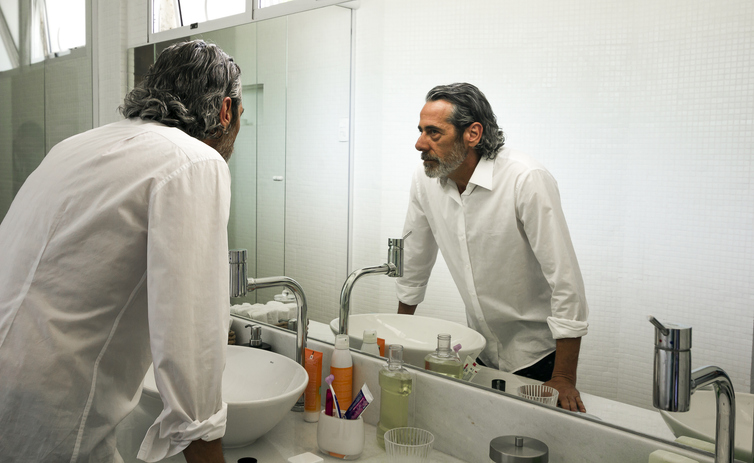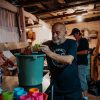The alarm clock rings signaling the start of the day. We hit the snooze button to prolong the inevitable. We have to get out of bed and begin our morning rituals. We start with prayer, make our beds, brush our teeth and hair, shave, get dressed, turn on the news, grab breakfast or a cup of coffee, not necessarily in that order. At some point, we’ll look in the mirror (highly recommended while shaving). According to research, 90% of us will look in a mirror before leaving the house. You might think, no big deal, but this simple act can contribute to poor “self-images.” In a society that judges us based on our body image, we may see ourselves as too old, too fat, too thin, wrinkled – you catch my drift.
When looking in the mirror, the chances are fairly good, we focus on what is directly in front of us, our own image. We ask ourselves: How do I look? Is there something stuck in my teeth? Are my teeth white enough? Do my clothes fit?
It is only natural that we focus on ourselves. But if you are spending too much time looking at yourself, it may be an indication of narcissism. Narcissus, a figure from Greek mythology, was so handsome that he fell in love with his own image reflected in a pool of water. It involves having too high of an opinion of ourselves. However, at the other end of the spectrum, we find those that have a “fear of mirrors,” a psychological term called “eisoptrophobia.” “The specific reasons as to why they are so opposed to mirrors may be due to countless different reasons, such as them having deep insecurities and a very poor self-image or their reasons may be less about their physical appearance and more about individual superstitious beliefs. For most “normal” people, using a mirror is a momentary event. It is a tool that serves a purpose and once we’re done, we move on.”
It may seem odd, but in many ways, our focus with the mirror is similar to how we live our lives, in the present. Like looking in the mirror, too often we lose sight of what is in the background, what is behind us or how far we have come. When we focus too much on ourselves, we often forget the people that have helped and supported us, those that have loved us despite our flaws, mistakes and sins, and a God that has never forsaken us. Christian website, the Witness.org, tells us:
“The Book of Ecclesiastes reminds us that “There is nothing new under the sun.” It’s an invitation to remember what has happened before so we’re better prepared for what might come next. Yet, while remembering and learning are encouraged, there’s also a strong message not to dwell excessively on bygone days.”
Living, or leading, is the sum total of our past experiences, current decisions and vision of the future. While we are encouraged to remember, and honor the past, Warren W. Wiersbe, American pastor and writer, reminds us:
If you look closely at how Jesus led, you’ll find that He answered questions by drawing from the past (scripture), acting in the present (modeling behaviors), always focusing on His vision of the future (the fulfillment of His purpose – the redemption of others). It is this vision that bonded 12 individuals into His disciples, and the promise of His vision that drives us to pursue leading like Jesus.
In leading like Jesus, we commit to leading, not as a management theory or practices, but as a way of living. We commit ourselves to the life-long journey of becoming disciples. Jonathan Parnell, lead pastor of Cities of Church in St. Paul, MN, provides a biblical foundation for understanding this form of discipleship. He says:
“The standard definition of “disciple” (noun) is someone who adheres to the teachings of another. It is a follower or a learner. It refers to someone who takes up the ways of someone else. Applied to Jesus, a disciple is someone who learns from him to live like him — someone who, because of God’s awakening grace, conforms his or her words and ways to the words and ways of Jesus. Or, you might say, as others have put it in the past, disciples of Jesus are themselves “little Christs” (Acts 26:28; 2 Corinthians 1:21).
As we all continue life’s journey, the decisions that we make and the behaviors that we model in the present will shape the future that our families, and those we lead, will experience. We should celebrate our present accomplishments, but it is equally important that we reflect and recognize that seldom do we accomplish them on our own.
Challenge: Read Footprints in the Sand (also called His Promise). The poem written by Mary Stevenson, at the age of 14, to remind us that God is always walking with us, and during our challenges, He is often carrying us. Take a moment to reflect on your past. Think about your successes, failures and challenges. Whose footprints do you see?
Read Lead Like Jesus Revisted to grow in your leadership journey.










